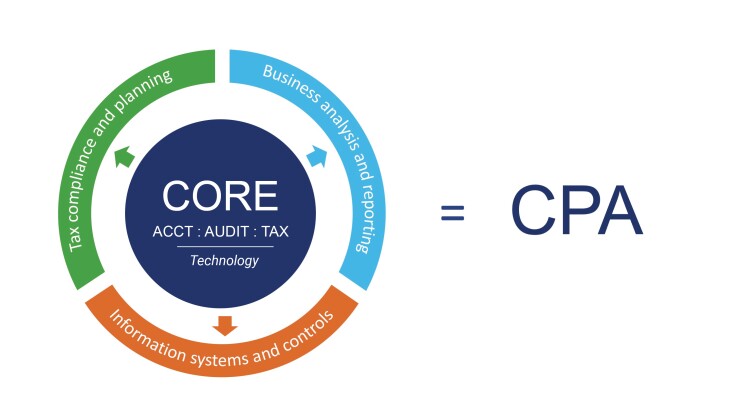The American Institute of CPAs and the National Association of State Boards of Accountancy debuted their
Representing a joint effort from the AICPA and NASBA, the CPA Evolution model aims to better prepare CPAs with the ever-changing skills and competencies required from modern professionals. The curriculum was developed by the CPA Evolution Model Curriculum Task Forces, consisting of more than 40 volunteers across all facets of the accounting profession. The new competencies will be reflected in the 2024 Uniform CPA Exam.
“A skill set that includes a deep understanding of new and emerging technologies is essential for CPAs entering the profession," said Sue Coffey, CEO of public accounting at the American Institute of CPAs, in a statement. "We heard from accounting faculty that they want insight into how to begin transitioning their programs to teach these skills and better prepare students for the coming Core + Disciplines CPA Exam structure. We’re excited to share the work of our task forces and help faculty prepare a strong pipeline of future CPAs who will continue to meet the changing needs of U.S. capital markets.”

The CPA Evolution Model Curriculum comprises two main elements:
- Detailed content suggestions — featuring modules, topics and learning objectives — covering content for all future CPAs (the Core), in addition to three separate Disciplines (Business Analysis and Reporting, Information Systems and Control, Tax Compliance and Planning); and,
- Examples of course structuring.
Utilizing feedback from faculty members on the task forces, the curriculum suggests courses where content may be taught, as well as time estimates for instruction on each topic.
“The CPA Evolution Model Curriculum is a valuable resource tool for the academic community by providing examples of how to address any gaps between what is currently taught by accounting programs today and the skills and competencies expected of CPAs by their clients in a technology-driven environment,” said Dan Dustin, NASBA vice president of state board relations, in a statement. “The curriculum includes an array of accounting content including traditional accounting content of financial/managerial accounting, audit, and tax, but it also includes content in the increasingly important technology-related areas of accounting data analytics, digital acumen and IT governance and controls."
The curriculum presumes that students will complete prerequisite coursework in principles of financial accounting, principles of managerial accounting, and core business courses including economics, finance and business law. The curriculum does not specify whether content should be covered at the undergraduate or graduate level, as this will differ from different accounting programs.
The AICPA has implemented a number of resources to help collegiate accounting program transition to the CPA Evolution licensure model:
- The
Academic Resource Hub offers case studies, assignments, readings and webinars to help accounting educators prepare their students; - The
Faculty Hour webcast series Faculty Hour webcast series provides regular CPA Evolution status updates and discussions on new accounting curricula; and, - Updated frequently asked questions on the CPA Evolution Model Curriculum are available on
ThisWayToCPA's site.
NASBA will also continue to provide the various Boards of Accountancy and the academic communities within their states ongoing support through videos and webinars.
The CPA Evolution launch will continue on Wednesday, June 16. More information is available on the American Accounting Association's





